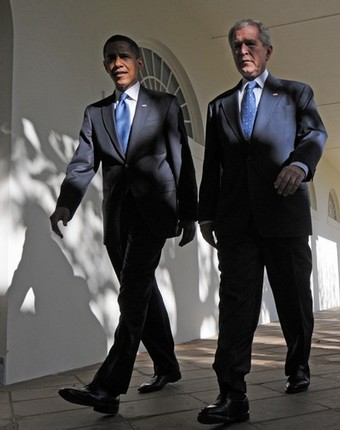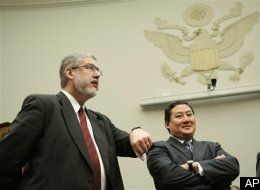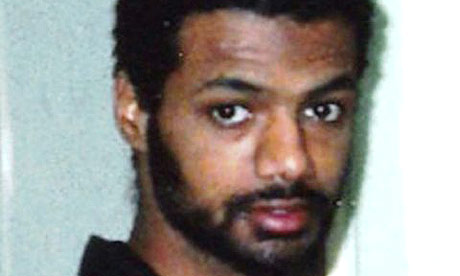Chapman University officials have received several notes of concern about my decision
to offer Professor John Yoo a distinguished visitorship at the Chapman University School
of Law. Professor Yoo has been a well-regarded member of the law faculty at the
University of California, Berkeley's Boalt Hall School of Law since 1993, one of the top
law schools in the nation. He visited at the University of Chicago in 2003 and held the
Distinguished Fulbright Chair in Law at the University of Trento (Italy) in 2006. While I
acknowledge the controversy surrounding the legal positions Professor Yoo articulated
during his tenure as deputy assistant attorney general in the Office of Legal Counsel of
the U.S. Department of Justice during the administration of President George W. Bush,
we are very much looking forward to Professor Yoo's visit at Chapman University,
where our students and, indeed, the entire academic community here at Chapman, can
engage him in a serious, yet civil, scholarly discussion of the issues on which he provided
legal counsel while serving in the administration.
In this, our position is not unlike that of Christopher Edley, Professor Yoo's Dean at
Berkeley, and presently a leading member of President-Elect Barack Obama's transition
team. Dean Edley's position in defense of academic freedom is a model for us all. It is
available at http://www.law.berkeley.edu/news/2008/edley041008.html. Dean Edley
noted that "in Berkeley's classrooms and courtyards our community argues about the
legal and moral issues with the intensity and discipline these crucial issues deserve.
Those who prefer to avoid these arguments--be they left or right or lazy--will not find
Berkeley or any other truly great law school a wholly congenial place to study. For that
we make no apology."
It would be simple for academic institutions to ignore views from one end or the other of
the political spectrum. Indeed, all too many law schools have faculties that are much too
homogenous with respect to their views on contested matters. We, on the other hand,
pride ourselves on having built a law school that is now one of the most ideologically
diverse in the nation. Several members of our faculty have clerked at the Supreme Court,
but the Justices for whom they worked run the gamut on the ideological spectrum, from
the late Chief Justice Rehnquist and Justice Thomas to Justices Brennan, Stevens, and
Souter. This semester we have Richard Falk as our Bette & Wylie Aitken Distinguished
Visiting Professor. Professor Falk, the Albert G. Milbank Professor of International Law
and Practice, Emeritus at Princeton University, is an internationally recognized human
rights scholar, but also extremely controversial. He was recently named the U.N.'s
rapporteur on the Palestinian territories, but his views are so hostile to Israel that Israel
has denied him a visa. He has in addition authored the preface to a book that argues that
the Bush administration was complicit in the attacks on September 11, commending the
book for its "single coherent account" of the accusations, and he is listed by David
Horowitz as one of "The 101 Most Dangerous Academics in America." I have no doubt
that people on the other side of the political aisle from Professor Falk are as troubled by
his having a visiting appointment at Chapman as others are by John Yoo's appointment,
but students and faculty of every political stripe have found his presence here to be both
stimulating and thought-provoking, and we fully expect the same result from Professor
Yoo's visit.
Finally, I would encourage those who object to Professor Yoo's appointment here to read
his scholarly work on the subject of Executive power, and in particular the memos he
authored while serving in the administration. Read, too, the full range of serious
commentary on that work. You will find that Yoo's position, while disputed, is far from
ignorant or disrespectful of the Constitution. No less a constitutional law scholar than
Harvard's Alan Dershowitz had made similar constitutional arguments in favor of
executive power in time of war. See, for example,
http://www.opinionjournal.com/editorial/feature.html?id=110010832.
In the wake of 9/11, President Bush pledged to use every legal and constitutional tool at
his disposal to prevent another attack on our homeland. Some of the task of identifying
the line between legal and illegal, constitutional and unconstitutional, fell to Professor
Yoo during his time of service in the administration. Many believe his legal analysis was
flawed, but others, serious constitutional scholars and historians among them, think he
got it right or at least made a fair stab at it. The opportunity to explore some of the most
profoundly important legal questions of our age with someone who was actually present
and involved in the them, whether it be Professor Falk or Professor Yoo, is a phenomenal
opportunity for our students, even (and perhaps especially) those who vehemently
disagree with the positions they have taken. As Dean Edley noted, that is the mark of a
truly great law school, and I am honored to say that Chapman is increasingly worthy of
being considered in such company, in no small measure due to prominent appointments
such as Richard Falk and John Yoo.
 Senate Judiciary Committee Chairman Patrick Leahy announced today he will hold a hearing next week to examine options for forming a nonpartisan commission to look into past national security polices and abuses of the Bush administration.
Senate Judiciary Committee Chairman Patrick Leahy announced today he will hold a hearing next week to examine options for forming a nonpartisan commission to look into past national security polices and abuses of the Bush administration.


 Bookmark
Bookmark


 Â Â
  





 The American Civil Liberties Union has released previously classified excerpts of a government report on harsh interrogation techniques used in Iraq, Afghanistan and Guantanamo Bay. These previously unreported pages detail repeated use of "abusive" behavior, even to the point of prisoner deaths.Â
The American Civil Liberties Union has released previously classified excerpts of a government report on harsh interrogation techniques used in Iraq, Afghanistan and Guantanamo Bay. These previously unreported pages detail repeated use of "abusive" behavior, even to the point of prisoner deaths. 
 An attorney for President Obama's Department of Justice has told the Ninth U.S. Circuit Court of Appeals that it supports the Bush administration's controversial state secrets defense in a lawsuit over the prior president's "extraordinary rendition" program.
An attorney for President Obama's Department of Justice has told the Ninth U.S. Circuit Court of Appeals that it supports the Bush administration's controversial state secrets defense in a lawsuit over the prior president's "extraordinary rendition" program.








 Â View Larger Image
 View Larger Image The
prospect of revenge and justice against the kidnappers and torturers of
the Bush administration have been prime drivers for many Obama
activists which explains the huge cloud of disillusionment that is
spreading across Washington. The activists could stand a rollback on
the Iraqi withdrawal, a troop build up in Afghanistan, even the
unwillingness to seek the impeachment of Bush and Cheney. But the final
straw has come with the confirmation hearing of Leon Panetta, the
incoming head of the Central Intelligence Agency.
The
prospect of revenge and justice against the kidnappers and torturers of
the Bush administration have been prime drivers for many Obama
activists which explains the huge cloud of disillusionment that is
spreading across Washington. The activists could stand a rollback on
the Iraqi withdrawal, a troop build up in Afghanistan, even the
unwillingness to seek the impeachment of Bush and Cheney. But the final
straw has come with the confirmation hearing of Leon Panetta, the
incoming head of the Central Intelligence Agency. 





 Two days after taking the helm of a country ready for change after eight years of George W. Bush, President Obama has allowed one controversial "War on Terror" tactic to remain in place: rendition.
Two days after taking the helm of a country ready for change after eight years of George W. Bush, President Obama has allowed one controversial "War on Terror" tactic to remain in place: rendition.
